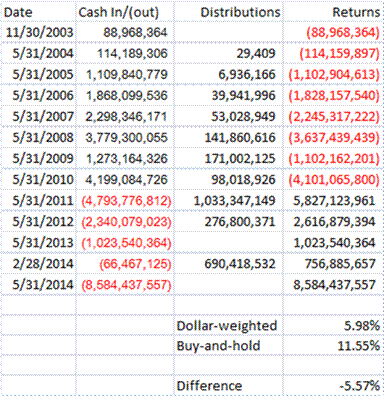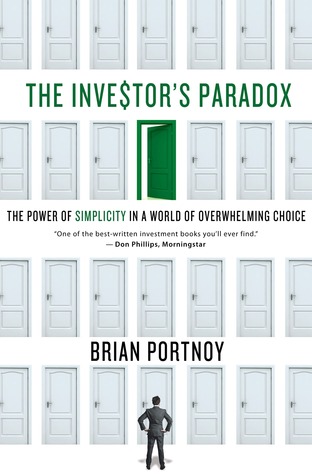The Best of the Aleph Blog, Part 34

=========================
In my view, these were my best posts written between May 2015 and July 2015:
Learning from the Past, Part 5b [Institutional Stock Version]
Learning from the Past, Part 5c [Institutional Stock Version]
How I did a bad job for Hovde on Scottish Re and National Atlantic Holdings.? Also, what I did to mitigate the errors.? (And I am supposed to be really good with insurance companies…)
The SEC Pursues a Fool?s Errand
On why the Consolidated Audit Trial [CAT] is a bad idea.? Preventing “flash crashes” is not a desirable goal; they teach people not to use market orders, and to be careful.? The market is a place for big guys, not little guys.
What do you have to be careful about if you are entering into a partnership?
On Risk-Based Liquidity and Systemic Risk
On how the Federal Government is making a mess of post-crisis policy.? The best policies would be:
- Regulate banks, money market funds and other depositary financials tightly.
- Don?t let them invest in one another.
- Make sure that they have more than enough liquid assets to meet any conceivable liquidity withdrawal scenario.
- Regulate repurchase markets tightly.
- Raise the amount of money that has to be deposited for margin agreements, until those are no longer a threat.
- Perhaps break up banks by ending interstate branching. ?State regulation is good regulation.
Advice to a Friend on a Concentrated Private Stock Position from His Employer
How to analyze a large position in your employer’s stock.? Lots of potential for gain and loss because of the lack of diversification in one stock.
There?s a Reason for Risk Premiums
Some academic literature implicitly treats risk premiums as “free money” if you hold it long enough.? But there’s the problem: can you hold it long enough?? Also, sometimes the extra returns are so small that they are not worth the risk.
On Bond Market Illiquidity (and more)
On Bond Market Illiquidity (and more) Redux
Some things aren’t meant to be highly liquid, and it is foolish to worry about the lack lack of liquidity.? The second article covered some good questions that I got asked, including bonds that are predominantly “bought and held,” and the limitations on investment banks to hold inventory post-crisis.
More reasons why you should keep a supply of cash on hand.
In this period, I couldn’t find any new stocks to buy.? What should I do?
What do you recommend when stocks and bonds are likely to return the same amount over the next ten years?? I leaned toward the bonds, which so far has been the wrong call.
The Phases of an Investment Idea
Sixteen Implications of ?The Phases of an Investment Idea?
How to analyze the cycles that investment ideas go through.? People think about it linearly, which helps lead to the booms and busts.? The second article gives 16 practical applications of the idea to illustrate the general theory.
Avoid Indexed Life Insurance Products
Why indexed insurance products give subpar returns with reduced volatility, assuming the insurer stays solvent.
Asset-Liability Mismatches and Bubbles
In this article, I argue that China has been indirectly encouraging its banks to run huge risks by financing illiquid assets with liquid liabilities.? Again, the risk hasn’t materialized yet.
?…in this short post I would like to point out two ways to stop the gaming.
- Define your index to include all securities in the class (say, all US-based stocks with over $10 million in market cap), or
- Control your index so that additions and deletions are done at your leisure, and not in any predictable way.
I discussed the unwillingness of Doubleline to cooperate with Morningstar to analyze certain Doubleline funds, and why it was reasonable in some ways for Doubleline to refuse, and Morningstar to not give favorable ratings.? That said, I concluded that Morningstar should apologize to Doubleline.? This article earned me polite calls from both sides, and one request to take the article down voluntarily.? I politely refused.
What is Liquidity? (Part VIII)
The occasional series that never ends.? Ten things that affect the liquidity of an asset, and explaining the Treasury “flash crash.”
It?s Difficult to Make Predictions, Especially About the Future
It is a fatal attraction, but if you are going to write about investing, you will have to make some predictions about markets.? Just try to keep them from being too outlandish.
We Eat Dollar Weighted Returns ? VI
In which I analyze the Hussman Strategic Growth fund and the large negative difference between time-weighted and dollar-weighted returns.
Stock Valuations: Micro and Macro
Can valuation measures applied to individual companies be used to value the market as a whole?? Under what conditions, or, is there a better way?
The School of Money, First Grade
This was the first of what was going to be sixteen articles.? I was thinking of turning it into a book.? Things have been too busy for that.? This article is about figuring out what you want to do in life.
Pick a Valid Strategy, Stick With It
Many amateur investors give up on a strategy just as it is about to start succeeding, and choose a strategy that has performed well, only to watch it underperform.
Bid Out Your Personal Insurance Policies!
I give you at least five reasons why you should bid out your personal insurance policies every three years or so.? Underwriting rules and premiums change, and some companies take advantage of loyalty.










